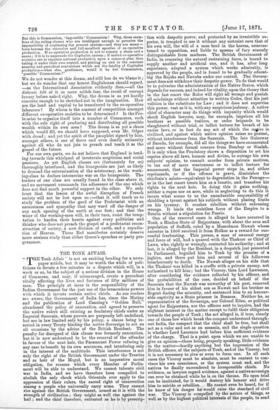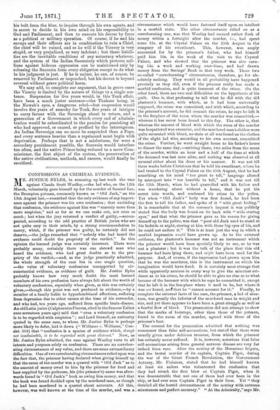THE TONE AFFAIR. " T HE Tonk Affair" is not an
exciting heading for a news- paper article, but it may be worth the while of poli- ticians to devotea few minutes to a dispute which will, in a week or so, be the subject of a serious division in the House of Commons, and may, if mismanaged, create a precedent vitally affecting the lives and fortunes of fifty millions of men. The principle at issue is the responsibility of the Indian Government for the just use of the tremendous powers with which it invests certain native chiefs. As our readers are aware, the Government of India has, since the Mutiny and the publication of Lord Canning's "Golden Bull," abandoned the policy of annexation, and agreed to preserve the native rulers still existing as feudatory chiefs under an Imperial Suzerain, whose powers are purposely left undefined, but are in law limited only by his policy, a clause being in- serted in every Treaty binding the native Sovereign to act on all occasions by the advice of the British Resident. The penalty for disregard of this clause was formerly annexation, but it is now understood to be the removal of the offender in favour of the next heir, the Paramount Power refusing in any case to benefit by its own sentences, and interfering only in the interest of the multitude. This interference is not only the right of the British Government under the Treaties and as heir of the Mogul, but is an imperative moral obligation, for reasons which every Member of Parlia- ment will be able to understand. We cannot tolerate ciVil war in India, and we have therefore been compelled to abolish the only check which Orientals ever apply to the oppression of their rulers, the sacred right of insurrection among a people who universally carry arms. They cannot rise against the British Government, armed as it is with the strength of civilization ; they might as well rise against the hail ; and the chief therefore, entrusted as he is by prescrip- tion with despotic power, and protected by an irresistible su- perior, is tempted to use it without any restraint save that of his own will, the will of a man bred in the harem, unaccus- tomed to opposition, and liable to spasms of fury scarcely distinguishable from madness. The British Government of India, in removing the natural restraining force, is bound to supply another and artificial one, and it has, after long experience, adopted a system which works admirably, is approved by the people, and is found to be gradually educat- ing the Rajahs and Nawabs under our control. The Govern- ment does not withdraw their despotic power. To do that would be to pulverize the administration of the Native States, which depends for success, and indeed for vitality, upon the theory that in the last resort the Ruler will right all wrongs and punish all misdoings without attention to written Codes, that his just volition is the substitute for Law ; and it does not supervise this power, vast as it is, with any suspicious jealousy. A native chief of character may do things with impunity which would shock English lawyers, may, for example, imprison all his brothers as possible traitors, or order brigands to be slaughtered without trial, or inflict torture for breach of his excise laws, or in fact do any act of which the nueive is civilized, and against which native opinion raises no protest, without interference from the Suzerain. The late Guicowar of Baroda, for example, did all the things we have enumerated and more without formal censure from Bombay or Simlah. It is only when the Feudatory shows a disposition to set his caprice above all laws, human and divine, to outrage his own subjects' opinion, to commit murder from private motives, to tax out of mere wantonness or to inflict torture for amusement, that the Imperial power steps in, and either reprimands, or if the offence is grave, diminishes the chieftain's salute—equivalent to degradation in the Peerage— or in the last resort treats him as a lunatic, and transfers his rights to the next heir. In doing this it gains nothing, neither a rupee nor an acre, while in neglecting to do this it incurs what seems to us the unendurable responsibility of shielding a tyrant against his subjects without placing limits on his tyranny. It crushes rebellion without redressing wrongs. It lends the resistless force of the Empire to a Bomba without a stipulation for Poerio.
One of the reserved cases is alleged to have occurred in Tonic, a Hindoo State of Rajpootana, with about the area and population of Suffolk, ruled by a Mussulman Nuwab whose ancestor in 1806 received it from Holkar as a reward for suc- cessful freebooting. This person, a man of unusual energy and force of will, had a quarrel with the Thakoor or Chief of Lawa, who, rightly or wrongly, contested his authority ; and at last, it is alleged by the Resident, in a despatch just presented to Parliament, beguiled him to Tonk by the promise of a jaghire, and there put him and several of his followers treacherously to death. The Nuwab alleges on his side that the Thakoor was killed in a scuffle with a private enemy, not authorized to kill him ; but the Viceroy, then Lord Lawrence, after considering the evidence collected by his officers, and the probabilities of the case, decided on behalf of the Suzerain that the Nuwab was unworthy of his post, removed him in favour of his eldest son as Nuwab and his brother as Regent during the minority, and sentenced him to an honour- able captivity as a State prisoner in Benares. Neither he, as representative of the Sovereign, nor Colonel Eden, as political agent for Rajpootana, nor the officers sent to inquire, had the slightest interest in the matter except to fulfil their obligation towards the people of Tonk ; the act alleged is, if true, clearly one of those few which break the compact understood through- out India, the compact that the chief shall be free, but shall act as a ruler and not as an assassin, and the single question is whether Lord Laurence had before him sufficient evidence of the charge. That is a point upon which we are unable to give an opinion—there being, properly speaking, little evidence in the matter—hardly anything but the impression of the British officers, of the subjects of Tonk, and of the Viceroy, but it is not necessary to give or even to form one. In all such cases the Viceroy must be absolute, must be content to con- vince his own conscience, or the system must end, and the natives be finally surrendered to irresponsible chiefs. No evidence, as lawyers regard evidence, against a native sovereign can ever be obtained while he is on the throne. No open trial can be instituted, for it would destroy his honour and drive him to suicide or rebellion. He cannot even be heard, for if he knew of his danger he would raise the standard of civil war. The Viceroy is compelled by the nature of things, as well as by the highest political interests of the people, to send
his bolt from the blue, to inquire through his own agents, and in secret to decide in his own mind on his responsibility to God and Parliament, and then to execute his decree by force as a political or military operation. Of course, if he and his envoys and their officers are in combination to ruin a Chief, the chief will be ruined, and so he will if the Viceroy is very stupid, or very prejudiced, or very indolent ; but those liabili- ties are the inevitable conditions of any autocracy whatever, and the system of the Indian Suzerainty which protects mil- lions against hideous oppression can be maintained only by releasing the Suzerain from every obligation except to do what in his judgment is just. If he is unjust, he .can, of course, be removed by Parliament or impeached, but his decree is beyond reversal without grave political harm.
We may add, to complete our argument, that in grave cases the Viceroy is limited by the nature of things to a single sen- tence. Suspension for five years would, in this Tank affair, have been a much juster sentence—the Thakoor being, in the Nuwab's eyes, a dangerous rebel—but suspension would involve five years of anarchy for Tonic, five years of intrigue to curry favour with the Sovereign about to return, and a generation of a Government in which every end of adminis- tration would be subordinated to the passion for punishing all who had approved, or caused, or profited by the interregnum. An Indian Sovereign can no more be suspended than a Pope, and every sentence heavier than a reprimand must begin with deprivation. Perhaps that is not a misfortune, for were a secondary punishment possible, the Suzerain would interfere too often, and the native Prince being reduced to a mere Com- missioner, the first object of the system, the preservation of the native civilizations, methods, and careers, would finally be sacrificed.



































 Previous page
Previous page